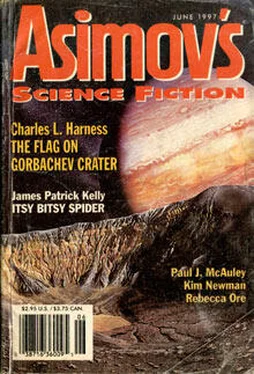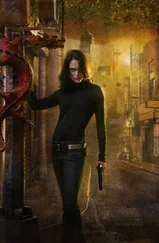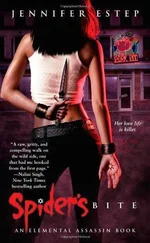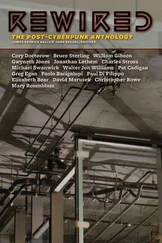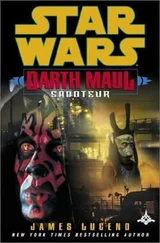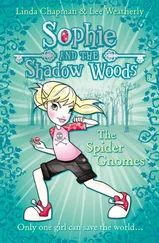Itsy Bitsy Spider
by James Patrick Kelly

Illustration by Laurie Harden
When I found out that my father was still alive after all these years and living at Strawberry Fields, I thought he’d gotten just what he deserved. Retroburbs are where the old, scared people go to hide. I’d always pictured the people in them as deranged losers. Visiting some fantasy world like the disneys or Carlucci’s Carthage is one thing, moving to one is another. Sure, 2038 is messy, but it’s a hell of a lot better than nineteen-sixty-whatever.
Now that I’d arrived at 144 Bluejay Way, I realized that the place was worse than I had imagined. Strawberry Fields was pretending to be some long-lost suburb of the late twentieth century, except that it had the sterile monotony of cheap VR. It was clean, all right, and neat, but it was everywhere the same. And the scale was wrong. The lots were squeezed together and all the houses had shrunk—like the dreams of their owners. They were about the size of a one-car garage, modular units tarted up at the factory to look like ranches, with old double-hung storm windows and hardened siding of harvest gold, barn red, forest green. Of course, there were no real garages; faux Mustangs and VW buses cruised the quiet streets. Their carbrains were listening for a summons from Barbara Chesley next door at 142, or the Goltzes across the street, who might be headed to Penny Lanes to bowl a few frames, or the hospital to die.
There was a beach chair with blue nylon webbing on the front stoop of 144 Bluejay Way. A brick walk led to it, dividing two patches of carpet moss, green as a dream. There were names and addresses printed in huge lightstick letters on all the doors in the neighborhood; no doubt many Strawberry Fielders were easily confused. The owner of this one was Peter Fancy. He had been born Peter Fanelli, but had legally taken his stage name not long after his first success as Prince Hal in Henry IV Part 1. I was a Fancy too; the name was one of the few things of my father’s I had kept.
I stopped at the door and let it look me over. “You’re Jen,” it said.
“Yes.” I waited in vain for it to open or to say something else. “I’d like to see Mr. Fancy, please.” The old man’s house had worse manners than he did. “He knows I’m coming,” I said. “I sent him several messages.” Which he had never answered, but I didn’t mention that.
“Just a minute,” said the door. “She’ll be right with you.”
She? The idea that he might be with another woman now hadn’t occurred to me. I’d lost track of my father a long time ago—on purpose. The last time we’d actually visited overnight was when I was twenty. Mom gave me a ticket to Port Gemini, where he was doing the Shakespeare in Space program. The orbital was great, but staying with him was like being under water. I think I must have held my breath for the entire week. After that, there were a few, sporadic calls, a couple of awkward dinners—all at his instigation. Then twenty-three years of nothing.
I never hated him, exactly. When he left, I just decided to show solidarity with Mom and be done with him. If acting was more important than his family, then to hell with Peter Fancy. Mom was horrified when I told her how I felt. She cried and claimed the divorce was as much her fault as his. It was too much for me to handle; I was only eleven years old when they separated. I needed to be on someone’s side and so I had chosen her. She never did stop trying to talk me into finding him again, even though after a while it only made me mad at her. For the past few years, she’d been warning me that I’d developed a warped view of men.
But she was a smart woman, my mom—a winner. Sure, she’d had troubles, but she’d founded three companies, was a millionaire by twenty-five. I missed her.
A lock clicked and the door opened. Standing in the dim interior was a little girl in a gold-and-white checked dress. Her dark, curly hair was tied in a ribbon. She was wearing white ankle socks and black Mary Jane shoes that were so shiny they had to be plastic. There was a Band-Aid on her left knee.
“Hello, Jen. I was hoping you’d really come.” Her voice surprised me. It was resonant, impossibly mature. At first glance I’d guessed she was three, maybe four; I’m not much good at guessing kids’ ages. Now I realized that this must be a bot—a made person.
“You look just like I thought you would.” She smiled, stood on tiptoe and raised a delicate little hand over her head. I had to bend to shake it. The hand was warm, slightly moist, and very realistic. She had to belong to Strawberry Fields; there was no way my father could afford a bot with skin this real.
“Please come in.” She waved on the lights. “We’re so happy you’re here.” The door closed behind me.
The playroom took up almost half of the little house. Against one wall was a miniature kitchen. Toy dishes were drying in a rack next to the sink; the pink refrigerator barely came up to my waist. The table was full-sized; it had two normal chairs and a booster chair. Opposite this was a bed with a ruffled Pumpkin Patty bedspread. About a dozen dolls and stuffed animals were arranged along the far edge of the mattress. I recognized most of them: Pooh, Mr. Moon, Baby Rollypolly, the Sleepums, Big Bird. And the wallpaper was familiar too: Oz figures like Toto and the Wizard and the Cowardly Lion on a field of Munchkin blue.
“We had to make a few changes,” said the bot. “Do you like it?”
The room seemed to tilt then. I took a small, unsteady step and everything righted itself. My dolls, my wallpaper, the chest of drawers from Grandma Fanelli’s cottage in Hyannis. I stared at the bot and recognized her for the first time.
She was me.
“What is this,” I said, “some kind of sick joke?” I felt like I’d just been slapped in the face.
“Is something wrong?” the bot said. “Tell me. Maybe we can fix it.”
I swiped at her and she danced out of reach. I don’t know what I would have done if I had caught her. Maybe smashed her through the picture window onto the patch of front lawn or shaken her until pieces started falling off. But the bot wasn’t responsible, my father was. Mom would never have defended him if she’d known about this. The old bastard. I couldn’t believe it. Here I was, shuddering with anger, after years of feeling nothing for him.
There was an interior door just beyond some shelves filled with old-fashioned paper books. I didn’t take time to look as I went past, but I knew that Dr. Seuss and A.A. Milne and L. Frank Baum would be on those shelves. The door had no knob.
“Open up,” I shouted. It ignored me, so I kicked it. “Hey!”
“Jennifer.” The bot tugged at the back of my jacket. “I must ask you…”
“You can’t have me!” I pressed my ear to the door. Silence. “I’m not this thing you made.” I kicked it again. “You hear?”
Suddenly an announcer was shouting in the next room. “… Into the post to Russell, who kicks it out to Havlicek all alone at the top of the key, he shoots… and Baylor with the strong rebound.” The asshole was trying to drown me out.
“If you don’t come away from that door right now,” said the bot, “I’m calling security.”
“What are they going to do?” I said. “I’m the long-lost daughter, here for a visit. And who the hell are you, anyway?”
“I’m bonded to him, Jen. Your father is no longer competent to handle his own affairs. I’m his legal guardian.”
Читать дальше
